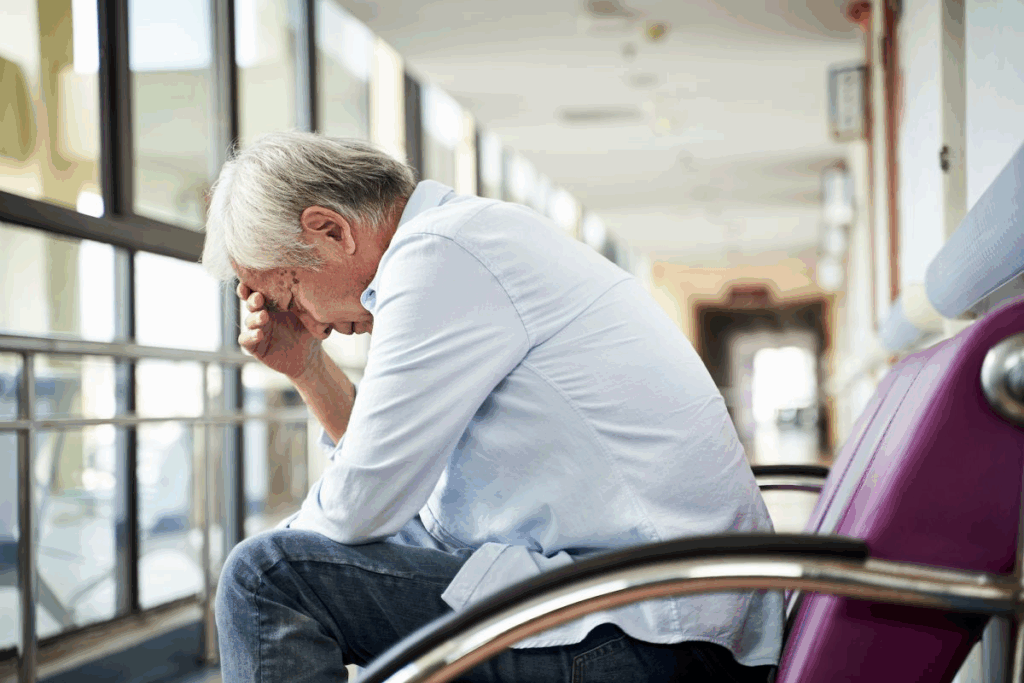Last Updated on October 31, 2025 by Bilal Hasdemir

Kidney stones are a common health issue affecting people of all ages and backgrounds. While often curable, ignoring them can lead to severe complications. These include urinary tract infections and chronic kidney damage can a kidney stone be fatal.
At Liv Hospital, we understand the risks of untreated kidney stones. Our patient-focused approach ensures these risks are recognized and managed. We provide preventive and curative health services to our patients.

Kidney stones are a growing concern due to their rising numbers and serious health risks. These stones form in the kidneys when there’s an imbalance of water, salts, and other substances in the urine. This imbalance causes minerals to crystallize and clump together, forming stones.
Kidney stones affect people worldwide. Studies show that about 15 percent of adults will get kidney stones at some point. In 2015, there were 22.1 million cases reported globally. The rate varies by region, influenced by diet, climate, and genetics.
| Region | Prevalence Rate |
| North America | 10-15% |
| Europe | 5-10% |
| Asia | 5-15% |
Kidney stones form due to many factors, including diet, how much you drink, genetics, and certain health conditions. Stones form when urine becomes concentrated, allowing minerals to crystallize and clump. Common types include calcium oxalate, uric acid, and struvite stones.
Factors Influencing Stone Formation:
Kidney stones can be classified into several types based on their composition. The most common types include:
“The type of kidney stone can significantly influence the treatment approach and prevention strategies.” – Medical Expert, Nephrologist
Knowing the different types of kidney stones and their causes is key to managing and preventing them. By understanding what contributes to stone formation, individuals can take steps to lower their risk.

Knowing the early signs of kidney stones is key to getting help quickly. These stones can cause many symptoms. If you catch them early, you can get better treatment.
Kidney stone pain is very bad and can be on one side of your back or flank. It might also spread to your lower belly and groin. This pain can come and go and might make you feel sick to your stomach.
Kidney stones can also affect how you pee. You might see blood in your pee, pee more often, or feel like you have to pee right away. Some people might feel a burning feeling when they pee or have trouble starting to pee.
Knowing when to see a doctor is important. If the pain is very bad, you’re vomiting, have a fever, or think you might have an infection, go to the hospital right away. Also, if you see blood in your pee or can’t pee, you should talk to a doctor.
When kidney stones are left untreated, the body tries to pass them through the urinary tract. This process can be influenced by several factors. These include the size and location of the stone.
The size of the stone is key in determining if it can pass naturally. Stones smaller than 5 mm often pass on their own. But, larger stones may need medical help.
The time it takes for a stone to pass naturally varies. It can take from a few days to several weeks. This time frame can differ from person to person.
Several factors can affect whether a stone passes naturally. These include:
Factors Influencing Stone Passage
| Factor | Effect on Stone Passage |
| Stone Size | Larger stones are less likely to pass naturally |
| Hydration | Adequate hydration can help facilitate stone passage |
| Urinary Tract Anatomy | Abnormalities can obstruct stone passage |
If a kidney stone doesn’t pass naturally, complications can arise. These may include:
In conclusion, understanding the natural course of untreated kidney stones is key. While some stones may pass on their own, others may need medical attention. This is to prevent complications.
Ignoring kidney stones can lead to serious health problems. Timely treatment is key. Untreated stones can harm not just the kidneys but overall health too.
Untreated kidney stones can cause urinary tract infections (UTIs). A stone blocking urine flow allows bacteria to grow, leading to infections. These infections can be severe and may need hospital care. Prompt treatment of kidney stones is essential to prevent such infections.
UTIs linked to kidney stones can turn into pyelonephritis, a kidney infection. This can cause a lot of pain and, if not treated quickly, can lead to sepsis.
Another issue with untreated kidney stones is hydronephrosis. This is when a kidney swells due to urine buildup. It happens when a stone blocks urine flow, causing pressure. Hydronephrosis can lead to significant pain and, if prolonged, can cause damage to the kidney.
The swelling from hydronephrosis can be very painful. It may need urgent medical help to relieve the blockage and prevent kidney damage.
Managing the pain from kidney stones is a big challenge. The pain is often severe and hard to control with usual pain meds. Sometimes, hospital care is needed to manage the pain and any complications.
It’s important to find effective ways to manage pain from kidney stones. This might include using different medications and other treatments to reduce pain and discomfort.
Ignoring kidney stones can lead to severe long-term consequences. These effects are not just on the kidneys but on overall health. Untreated kidney stones can cause persistent damage to kidney tissues, leading to chronic conditions.
Chronic kidney damage is a big concern for those who ignore kidney stones. Persistent stones can cause ongoing obstruction and inflammation. This leads to scarring and irreversible damage to the kidney tissues. This damage can result in a gradual decline in kidney function over time. As the kidney’s filtering capability is compromised, waste products can build up in the body, leading to various health complications.
A study published in the Journal of the American Society of Nephrology highlights that recurrent kidney stones can lead to chronic kidney disease (CKD). CKD is characterized by a gradual loss of kidney function over time, potentially progressing to end-stage renal disease (ESRD), where dialysis or a kidney transplant is required.
The presence of untreated kidney stones can significantly impact overall kidney function. When stones obstruct the urinary tract, they can cause a buildup of urine, leading to increased pressure on the kidneys. This pressure can impair kidney function and, if prolonged, can result in permanent damage. The risk is higher for individuals with pre-existing kidney conditions or those who have recurrent stone formation.
Also, the pain associated with kidney stones can be recurring. This can affect the quality of life. Chronic pain and recurrent urinary tract infections (UTIs) are common among individuals with untreated kidney stones, further complicating their health status.
When a kidney stone becomes lodged in the ureter for an extended period, it can cause severe and potentially irreversible damage. The prolonged obstruction can lead to hydronephrosis, a condition characterized by the swelling of the kidney due to the accumulation of urine. If not addressed, this can result in permanent kidney damage and potentially lead to kidney failure.
A stone stuck in the ureter for months can also lead to recurrent UTIs and sepsis, a life-threatening condition. The risk of developing these complications highlights the importance of seeking timely medical intervention for kidney stones.
The long-term consequences of ignoring kidney stones are severe. They can have a lasting impact on kidney health and overall well-being. It is essential for individuals experiencing symptoms of kidney stones to seek medical attention to prevent these complications.
“The risk of kidney damage from untreated kidney stones is a serious concern that should not be overlooked. Prompt medical evaluation and treatment are essential to prevent long-term health consequences.”
Kidney stones can be deadly, though it’s rare. We’ll look at cases where they caused serious problems. We’ll also talk about how common these problems are and what makes them more likely to happen.
Some people have died from kidney stones that weren’t treated. These cases often involve severe infections or kidney damage. For example, a blockage in the urinary tract can cause a deadly infection.
It’s important to know how many deaths kidney stones cause. Studies say thousands of people die from these complications every year. Even though it’s not common, it’s a serious risk.
Some things make kidney stone problems worse. These include other health issues, the stone’s size and where it is, and infections. People with weak immune systems or who wait too long to see a doctor are at higher risk.
Knowing who’s at risk helps doctors give them the care they need quickly.
Untreated kidney stones can cause serious problems, like sepsis and kidney failure. These issues can be very dangerous if not treated quickly. Kidney stones can block the urinary tract, leading to infections. These infections can spread to the blood and cause sepsis.
Sepsis happens when the body’s fight against an infection gets out of control. Kidney stones can cause a urinary tract infection (UTI). If not treated, this can lead to sepsis. Septic shock is a serious condition that can cause organ failure and death if not treated fast.
The journey from a UTI to septic shock is complex. It involves the infection, the body’s immune response, and the stone. Knowing how these factors work together is key to spotting at-risk patients and acting quickly.
Kidney failure is another risk from untreated kidney stones. A stone can block urine flow, causing pressure in the kidney. This can damage or fail the kidney.
People with existing kidney disease or only one kidney are at higher risk. For them, a kidney stone can be very dangerous. It’s important to get medical help right away.
It’s important to know the signs of serious problems. Look out for high fever, severe pain, vomiting, and signs of infection like chills or a high white blood cell count.
If you notice these symptoms, get medical help right away. Quick action can make a big difference. It can stop problems from getting worse and prevent serious issues like sepsis and kidney failure.
Some people are more likely to face serious problems from kidney stones. Knowing who is at risk helps doctors keep a closer eye on them and treat them more aggressively.
Age is a big factor in how serious kidney stones can be. Older adults often face more complications because their kidneys work less well and they may have other health problems.
Having other health issues can make kidney stones more serious. Conditions like diabetes, high blood pressure, and kidney disease can raise the risk of serious problems.
Common pre-existing conditions that worsen prognosis:
Genetics can also affect how serious kidney stones are. Certain genetic disorders, like cystinuria and primary hyperoxaluria, can make stones more likely to come back and be worse.
Genetic factors to consider:
Understanding these risk factors helps doctors spot who is most at risk. They can then give these people the care they need to avoid serious problems from kidney stones.
Diagnosing untreated kidney stones requires imaging and lab tests. These steps are key to finding stones and planning treatment.
Imaging is a big help in finding kidney stones. The main methods are:
Lab tests are key to checking how well the kidneys work and spotting stone-related issues. These tests include:
Keeping an eye on how stones change is important for managing them. This means:
Using these methods, doctors can find and manage kidney stones well. This helps avoid serious problems and improves health outcomes.
Dealing with kidney stones needs a mix of medical care and lifestyle changes. It’s important to know how to treat stones and prevent new ones.
Medical treatments are key in treating kidney stones. Shockwave lithotripsy is a common method. It uses shockwaves to break stones into smaller pieces that can pass easily.
Other treatments include:
These treatments are often very effective. They can greatly lessen the pain of kidney stones.
For more complicated cases, surgery might be needed. Percutaneous nephrolithotomy is a surgery to remove big stones or those blocking the flow. Surgery is usually for cases where other treatments don’t work.
| Treatment Option | Description | Indications |
| Shockwave Lithotripsy | Non-invasive procedure using shockwaves to break down stones. | Smaller stones, typically less than 2 cm in diameter. |
| Ureteroscopy | Procedure using a small scope to locate and remove stones. | Stones located in the ureter or smaller stones. |
| Percutaneous Nephrolithotomy | Minimally invasive surgery to remove larger stones. | Larger stones or those causing significant obstruction. |
To stop kidney stones from coming back, making big lifestyle changes is key. Drinking more water helps dilute urine and lowers mineral levels that can cause stones. Eating less sodium and more fruits and veggies is also important.
Other ways to prevent stones include:
Combining medical treatments with these lifestyle changes can greatly lower the risk of getting kidney stones again.
Getting treatment for kidney stones quickly is key to avoid serious problems. Without treatment, kidney stones can cause a lot of pain, infections, and even damage to the kidneys. We’ve talked about how kidney stones form, their symptoms, and the risks they pose.
It’s very important to get medical help right away. This can prevent long-term damage like chronic kidney disease or even kidney failure. Effective treatment can greatly improve life for those with kidney stones.
We stress the importance of being aware and taking steps to prevent kidney stones. Knowing the risks and taking preventive actions can lower the chance of getting kidney stones. Quick treatment is vital for good health.
Untreated kidney stones can cause serious problems. These include urinary tract infections and hydronephrosis. They can also make managing pain hard.
In severe cases, they can lead to life-threatening conditions like sepsis and kidney failure.
Yes, a kidney stone can be fatal in rare cases. Cases have shown that complications from kidney stones can be deadly. This is more likely in people with pre-existing conditions or genetic factors.
Age, pre-existing conditions like diabetes, and genetic factors increase the risk. These factors can make severe kidney stone cases more likely.
Kidney stones can cause urinary tract infections. These infections can spread to the bloodstream. If not treated, they can lead to septic shock, a life-threatening condition.
A stone stuck in the ureter for months can cause chronic kidney damage. It can also affect kidney function and lead to severe complications like hydronephrosis and kidney failure.
Warning signs include severe pain, fever, chills, and difficulty urinating. Blood in the urine is also a sign. If you have these symptoms, seek medical help right away.
Imaging techniques like CT scans or X-rays are used. Laboratory tests also assess kidney function and monitor stone progression.
Treatment options include medical interventions like pain management and hydration. Surgical approaches like lithotripsy or ureteroscopy are also used. Lifestyle changes can help prevent recurrence.
Yes, kidney stones can be prevented. Making lifestyle changes helps. Staying hydrated, eating a healthy diet, and managing medical conditions are key.
Yes, kidney stones are more common in some groups. This includes people with a family history, those with pre-existing conditions, and certain geographic regions.
Subscribe to our e-newsletter to stay informed about the latest innovations in the world of health and exclusive offers!
WhatsApp us